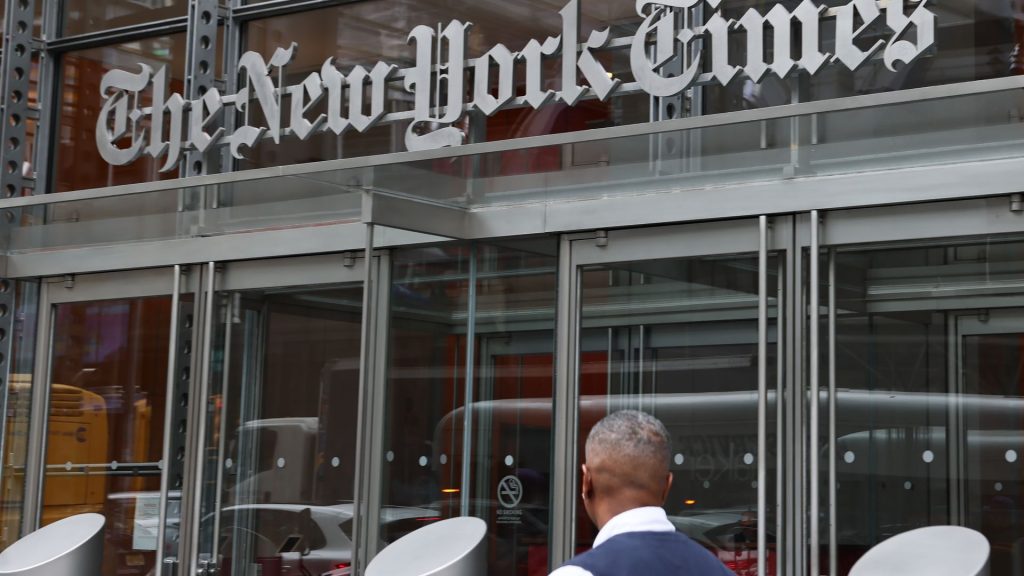Judge tosses Trump’s New York Times defamation suit for being too long

A judge threw out the defamation lawsuit filed by President Donald Trump against The New York Times. The judge left the door open for the president to refile the suit.
Lawsuit dismissed
Judge Steven D. Merryday maintained the suit was too long and did not follow federal rules for this kind of litigation.
“It is the kind of response that is appropriate to lawyers who aren’t otherwise showing that they’re capable of following the rules,” Rebecca Tushnet, a law professor at Harvard University, told Straight Arrow News.
The judge ruled the 85-page complaint from the president lacked “any legitimate legal claims.”
“As every lawyer knows (or is presumed to know), a complaint is not a public forum for vituperation and invective — not a protected platform to rage against an adversary,” Merryday wrote in the decision.
The judge went on to say the suit violates Rule 8, which has several requirements, including that complaints be a short and plain statement.
“There must have been various matters in that complaint which, from the judge’s point of view, were both inflammatory and irrelevant and so offended him,” Robert Post, a law professor at Yale University, told Straight Arrow News. “And he asked them to file a more professionally clean and competent complaint.”
As part of the dismissal, the judge gave the president’s lawyers one month to refile but put a 40-page cap on the next attempt.
“The complaint is this sort of laundry list of, you know, saying nice things about Trump and making irrelevant claims about how much he won the election by and making statements about his dad,” Tushnet said. “None of which is actually particularly relevant to whatever claim there might be.”
Lawsuit filed
Trump’s original filing talks extensively about the 2024 election, with nearly thirty mentions.
The president sued the paper for $15 billion, alleging that the paper and Penguin Random House aimed to damage his reputation ahead of the election.
“With the overwhelming victory, President Trump secured the greatest personal and political achievement in American history,” the complaint reads. “All across our country, Americans from a wide array of backgrounds saw the truth about him and voted accordingly — the same truth that the New York Times refused to recognize as it continued spreading false and defamatory content about President Trump.”
The president’s legal team cited books written by journalists from the New York Times, including one called “Lucky Loser.”
They also included excerpts of several articles that referred to Trump wanting to “rule like a dictator.”
“These publications were created with a backward methodology: the authors started with a desired narrative for the Book and the Articles, and then, to achieve that narrative, they falsified, distorted, and manipulated facts,” the suit reads.
The New York Times called the suit “meritless” and an attempt to stifle independent reporting.
Precedent
The famous Sullivan decision from the Supreme Court, which also involved the New York Times, requires an elected official in a defamation suit to prove the defendant lied with malice.
“It makes the dismissal easier, but this is just a really bad claim,” Tushnet said. “But certainly the Sullivan case is important in setting the ground rules, which is, you actually need to show falsity. You need to show malice. Those things are not easy.”
A president hasn’t sued a media outlet and won since former President Teddy Roosevelt in 1913.
What happens next?
The president’s legal team signaled they do plan to refile the case.
“Then likely, the New York Times will file a motion to throw out the lawsuit on grounds of various deficiencies, and either that will work or not,” Post said. “If not, then the lawsuit will move to discovery. And here it’s very odd that Trump files these suits, because that means he is subject to discovery, and that means that the New York Times can ask him many, many questions, get him to turn over many documents, and he’s typically quite loath to do that.”
The president is no stranger to lawsuits, and Post said he sometimes files not to win — but to send a message.
“It’s meant to convey a number of messages,” Post said. “One is to his base. He says, ‘I’m really innocent here and see how innocent I am. I’m going to take the trouble to file a lawsuit.’ So the filing of the suit is meant to be a form of vindication. And second, it’s meant to indicate to the New York Times, if you continue with this form of behavior, you’re going to face a lot of costs. Not necessarily that you’re guilty, but you’re going to spend a lot of time and money defending yourself.”
Trump v. the media
The lawsuit is part of a continuing negative relationship between the president and the press that dates back to his first term, when Trump popularized the term “fake news.”
Recently, that relationship has come under more fire with the Federal Communications Commission chairman’s recent threats against ABC, the subsequent suspension of comedian Jimmy Kimmel and Trump floating the idea of pulling TV network licenses if they’re “against” him.
“What it suggests is that it’s a really bad idea to have big media organizations that regularly need things from the government,” Tushnet said. “So, you’ll notice the Wall Street Journal, not famously liberal, has been perfectly willing to push back because it doesn’t actually need very much from the government, whereas ABC, CBS, they’ve wanted big mergers approved, and so they’ve fallen in line.”
That’s where lawsuits can be useful for the president.
“People are afraid of the transaction costs of having to defend a lawsuit, and so they self-censor,” Post said. “They say, I’d rather not say it because I don’t want to have to undergo the pain and trouble of defending a lawsuit, so better not say it in the first place. And it’s pretty clear that Trump does that a lot.”
Tushnet expressed concerns over these latest incidents.
“You don’t need to talk to a professor of the First Amendment to understand the ways in which this is stomping on our traditions of free speech and of that the government doesn’t get to control private opinion,” Tushnet said.
The post Judge tosses Trump’s New York Times defamation suit for being too long appeared first on Straight Arrow News.





